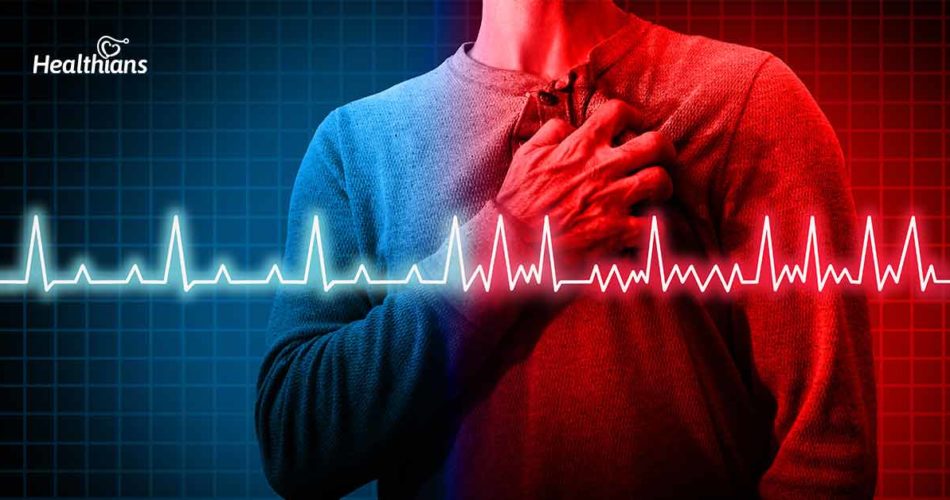Contributed by: Healthians Team
Introduction
Do you ever have the feeling that your heart is racing or fluttering a lot more than usual?
Perhaps your heart skips beats, or you can feel your pulse in your neck and chest. You may be having heart palpitations.
Heart palpitations can happen at any time and might last only a few seconds. Heart palpitations can occur when you are moving about, sitting or lying down, or even while standing.
The good news is that a rapid heartbeat does not always indicate a cardiac problem. Palpitations can be brought on by factors that make your heart work harder, such as stress, dehydration, exercise, illness and more.
Here are some easy ways to deal with heart palpitations.
Regular exercise
Exercise can help restore the heart’s normal rhythm and enhance overall cardiovascular health.
It can also aid in the reduction of anxiety and tension. Cardiovascular activity strengthens the heart, reducing or eliminating palpitations.
Exercises that are beneficial to have good heart health include low-impact exercises, such as walking, running, swimming, cycling and jogging.
High-impact exercises, on the other hand, might cause palpitations in certain people. Therefore it’s crucial to recognise and avoid harmful workouts.
Before beginning a new workout plan, speak with your doctor.
Cardio does not need to be difficult. Brisk walks offer a slew of health advantages, including weight loss, reduced blood pressure, and enhanced cardiovascular health.
Balanced diet
A balanced diet can lower your risk of coronary heart disease, prevent you from gaining weight, and even lowers the risk of diabetes and high blood pressure.
It can also aid in the reduction of cholesterol levels and the risk of some malignancies.
Foods that enhance heart health:
- Whole grains
- Berries
- Avocados
- Fatty fish and fish oil
- Walnuts
- Beans
- Dark chocolate
Avoid caffeine
Caffeine abstinence can help to lower blood pressure. Caffeine’s stimulatory impact on the nervous system has been found to boost blood pressure levels.
Caffeine consumption of 3 to 5 cups per day has also been linked to a higher risk of cardiovascular disease.
Avoid excessive alcohol
In heart patients, alcohol triggers heart issues and palpitations. While moderate drinking isn’t always harmful, recent evidence suggests that even one drink per day can raise the risk of atrial fibrillation. One of the symptoms of this illness is a palpitating heart.
To recover from alcohol-related cardiac problems, you must be fully dedicated to a lifestyle change.
This might be a difficult transition for some. It might be tough to commit to diet and exercise changes on your own, but when a doctor tells you that you need to eliminate alcohol from your life altogether, many people discover that they are unable to quit or even reduce their alcohol consumption.
So slowly and gradually avoid it to make your heart healthy.
Relaxing techniques
Stress, sickness, and the loss of muscle mass as we age cause us to breathe with our chest. We take quick, shallow breaths that only fill the top half of our lungs when we practise chest breathing.
Long durations of chest breathing might result in complications such as:
- Heart palpitations (your heart rhythm is disturbed)
- Dizziness
- Chest aches
Breathing should be a peaceful practice which can be rehearsed with patience. There are other relaxing techniques like :
- Massage
- Meditation
- Tai chi
- Yoga
- Biofeedback
- Music and art therapy
- Aromatherapy
Ensure electrolytes are balanced
The best way to keep the electrolytes balanced is to keep your body hydrated. For hydration, water is the most natural option.
It is less costly and easier to obtain than any other beverage.
Coconut water is another option for electrolyte replenishment. Coconut water has a low glycemic index, so it won’t spike your blood sugar levels.
It has also been demonstrated in studies to help lower blood pressure and cholesterol, which is a good reason to drink it.
Final thoughts
Heart palpitations are very common and most are ignored. So, now read what your heart has to say when you have breathing issues.
Here we have elaborated on the most common remedies that you can try to reduce the risk of heart palpitations.
If you are facing recurring issues of palpitations then you can take a preventive heart health test to get a comprehensive insight into your heart health.




